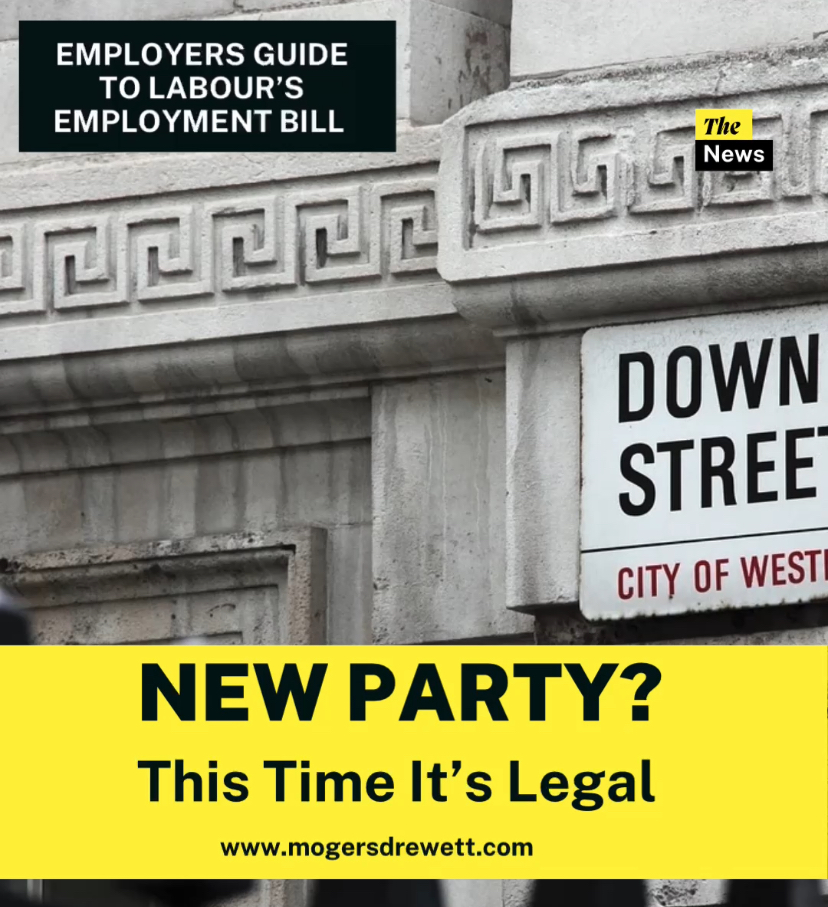New Party at Number 10? This time It’s Legal
Labour’s Proposed Employment Legislation: A Practical Guide for Employers
With increasing regularity, the polls seem to be indicating a sizeable majority for the Labour Party. As we face this ever more likely prospect of a change in Government, I thought it might be useful to review the Labour Party’s potential changes to employment legislation and highlight what these proposals could mean for your business.
This is particularly pertinent as Labour has stated that within 100 days of taking the helm, they will introduce their Employment Bill covering many of the points listed below. Whilst they also confirm that they will consult with businesses, workers and other parties to help with its implementation it won’t do any harm to be forewarned and reviewing your plans and policies in readiness for the likelihood of a Labour victory.
As the Managing Partner at Mogers Drewett and as an employment lawyer, I can offer both the legal and employer perspectives on these upcoming changes. We will always seek the practicable approach to tackling employment matters be they procedural or litigious, and it’s for this reason we’ve offered a simple structure for each change highlighting the Labour plan and the subsequent Changes Required to help you consider the options and plan.
Because I’m such a nice person and mindful of the headache of trawling through a 1000+ word article, I’ve set the various topics out in alphabetical order to make it easier to track and highlight specific points for action.
Basic Day One Rights
Labour Party Plan: Labour proposes to end qualifying periods for basic employment rights, such as unfair dismissal, sick pay, and parental leave, making these rights available from day one of employment.
Changes Required: This will necessitate significant adjustments in recruitment and probationary processes. Employers will need to implement more thorough hiring procedures and establish robust mechanisms to manage dismissals fairly from the outset. This change will likely spell the end of the short service dismissal approach embraced as a practical solution by employers, but demonised by Employment Judges.
Fair Pay
Labour Party Plan: Labour intends to implement a genuine Living Wage for all adult workers, remove age-related wage bands, strengthen statutory sick pay, ensure fair distribution of tips, ban unpaid internships (except those part of educational courses), and establish Fair Pay Agreements starting with the adult social care sector.
Changes Required: Businesses will need to budget for increased wage costs and review their payment practices. Implementing these changes might require revising payroll systems and ensuring compliance with new regulations around fair pay and sick pay.
Equality at Work
Labour Party Plan: Labour aims to tackle workplace inequality by preventing outsourcing to avoid equal pay obligations, establishing a regulatory unit for equal pay, and requiring large firms to develop action plans to close the gender pay gap. Additionally, they propose mandatory reporting on ethnicity and disability pay gaps.
Changes Required: Employers, especially large firms, (250+ employees) will need to prepare for comprehensive reporting and action planning to address pay gaps. This includes collecting and analysing data on employee demographics and pay and implementing strategies to ensure equality.
Family-Friendly Rights
Labour Party Plan: Labour plans to review and enhance parental leave policies, making them available from day one, protect pregnant women from dismissal for six months after their return to work, introduce paid carers’ leave, and clarify bereavement leave entitlements.
Changes Required: Businesses will need to update their leave policies and ensure compliance with new regulations. This may involve revising employee handbooks, training managers on the new policies, and adjusting workforce planning to accommodate increased leave entitlements.
Fire and Rehire
Labour Party Plan: Labour aims to end “fire and rehire” practices, where employees are dismissed and then re-engaged on less favourable terms. The Plan emphasises the need for proper restructuring processes, requiring genuine dialogue and mutual understanding between employers and employees. Labour proposes replacing the current statutory code of practice with a strengthened version to provide effective remedies against such abuses.
Changes Required: Employers must develop transparent and fair consultation processes, ensuring meaningful dialogue with employees about any changes to terms and conditions. Management should be trained on legal requirements and best practices for negotiations. Employment contracts need review and updates to reflect the prohibition on fire and rehire practices.
Flexible Working
Labour Party Plan: Labour proposes to make flexible working a right from day one, requiring employers to accommodate reasonable requests.
Changes Required: Employers will need to review and possibly revise their flexible working policies. This includes assessing which roles can support flexible working, setting clear guidelines for managing such requests, and ensuring fair and consistent application of these policies across the workforce.
Redundancy Rights
Labour Party Plan: Labour proposes that redundancy consultation rights be based on the total number of people affected across the business, rather than within a single workplace. This proposal also intends to now extend protections to workers.
Changes Required: This change will likely increase the situations requiring collective consultation. Employers need to prepare by understanding the new thresholds and ensuring compliance with the extended consultation requirements. Be prepared to include in your plans the responses for both employees and workers.
Right to Switch Off
Labour Party Plan: To prevent home-working from turning into constant work, Labour will introduce a ‘right to switch off,’ similar to policies in Ireland, France and Belgium.
Changes Required: Employers should develop clear policies on out-of-hours communication and ensure that employees are aware of their right to disconnect. This might involve setting expectations for email and message responses and ensuring managers respect these boundaries.
Self-Employment
Labour Party Plan: Labour aims to enhance rights for self-employed workers, including the right to a written contract, measures against late payments, and extending health and safety protections.
Changes Required: Businesses engaging self-employed workers will need to ensure they provide written contracts and comply with new payment and safety regulations. This may involve revising contractual agreements and implementing systems to ensure timely payments.
Single Status of Worker
Labour Party Plan: Labour proposes creating a single status of “worker” for all except the genuinely self-employed, simplifying employment status and extending rights to more individuals.
Changes Required: Employers will need to review their workforce composition and adjust their practices to accommodate the new worker status. This might include reclassifying some self-employed contractors as workers and ensuring they receive the appropriate rights and benefits.
Trade Union Rights
Labour Party Plan: Labour intends to strengthen workers’ rights to organise collectively and enhance union representation. This includes repealing restrictive legislation, allowing electronic and workplace balloting, and simplifying the union recognition process.
Changes Required: Businesses with unionised workforces will need to adapt to the new regulations and prepare for potentially increased union activity. This might involve revising policies on union interactions and ensuring compliance with new recognition procedures.
Whistleblowers
Labour Party Plan: Labour proposes to enhance protections for whistleblowers, particularly for women reporting sexual harassment.
Changes Required: Employers should review and strengthen their whistleblowing policies to ensure they offer adequate protection and support for those reporting misconduct. This includes training staff on the new regulations and ensuring confidentiality and a safe reporting environment.
Zero Hours Contracts
Labour Party Plan: Labour plans to ban exploitative zero-hours contracts, ensuring all workers receive contracts reflecting their regular hours worked over a twelve-week reference period. They also propose reasonable notice for shift changes and compensation for cancelled shifts.
Changes Required: Employers relying on zero-hours contracts will need to shift to more stable contractual arrangements. This involves reviewing current contracts, planning for regular hours, and establishing procedures for providing adequate notice for shift changes.
Conclusion
These proposed changes reflect Labour’s commitment to creating a fairer, more inclusive workplace. While the outcome of the election and the timing of any changes remain uncertain, as employers, we should start preparing for these potential impacts in the likelihood that the polls are indeed correct.
By staying informed and adopting a proactive approach, we can better navigate these changes effectively and plan with confidence to help avoid potentially costly errors and omissions.
My disclaimer here, (I’m a lawyer, what do you expect me to say ?), is that this is a very fluid situation and whilst a Labour administration would likely adopt the legislation and measures outlined above, they are all subject to change given the consultation process and well it’s politics isn’t it? The best advice is to note the details above and ensure that you have identified the relevant gaps in your policies, contacts and procedures, work out how you will address them to become compliant and await the word on the new Bill.
If you have any questions or need further guidance, don’t hesitate to reach out.
The full copy of Labour’s Plan to Make Work Pay can be found here:
https://labour.org.uk/wp-content/uploads/2024/06/MakeWorkPay.pdf
Sean McDonough – Managing Partner & Employment Lawyer


